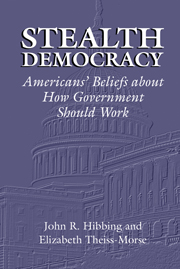Book contents
- Frontmatter
- Contents
- List of Figures
- List of Tables
- Acknowledgments
- Introduction
- PART I THE BENEFITS OF STUDYING THE PROCESSES PEOPLE WANT
- 1 Policy Space and American Politics
- 2 Process Space: An Introduction
- 3 Using Process Space to Explain Features of American Politics
- PART II THE PROCESSES PEOPLE WANT
- PART III SHOULD PEOPLE BE GIVEN THE PROCESSES THEY WANT?
- Epilogue
- Appendix A
- Appendix B
- References
- Index
- Titles in the series
3 - Using Process Space to Explain Features of American Politics
Published online by Cambridge University Press: 23 November 2009
- Frontmatter
- Contents
- List of Figures
- List of Tables
- Acknowledgments
- Introduction
- PART I THE BENEFITS OF STUDYING THE PROCESSES PEOPLE WANT
- 1 Policy Space and American Politics
- 2 Process Space: An Introduction
- 3 Using Process Space to Explain Features of American Politics
- PART II THE PROCESSES PEOPLE WANT
- PART III SHOULD PEOPLE BE GIVEN THE PROCESSES THEY WANT?
- Epilogue
- Appendix A
- Appendix B
- References
- Index
- Titles in the series
Summary
To this point, we have argued that process concerns are distinct from policy concerns, and we have shown that making the distinction between the two allows us to understand aspects of American politics in a way that policy space alone does not. We have not yet shown, however, that process preferences and perceptions have a significant impact on people's political attitudes and behaviors. That is precisely what we hope to accomplish in this chapter. We concentrate on four possible consequences. The central and most obvious is the likelihood that, regardless of the policies being produced, people who are convinced that governmental procedures do not match their own preferred procedures are more likely to be unhappy with the government. The other three can be seen as spinning off dissatisfaction with government. Specifically, dissatisfaction with process could lead people to advocate various approaches to reforming governmental processes, to vote for candidates who make procedural reform a major part of the campaign, and even to be less likely to comply with the outputs of the ostensibly flawed process.
Were we living in an unchangeable, autocratic police state, these potential consequences would not be important, but the United States is a democracy in which the people have a voice and in which a significant level of voluntary compliance with the law is necessary. If people are denying the system its needed support, are being seduced by unworkable reforms, or are ignoring statutes because they question the legitimacy of the procedures used to make them, the polity is weakened and the government will be less able to perform necessary tasks.
- Type
- Chapter
- Information
- Stealth DemocracyAmericans' Beliefs About How Government Should Work, pp. 61 - 84Publisher: Cambridge University PressPrint publication year: 2002



